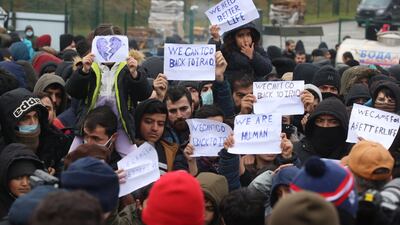A group of asylum-seekers who are being held in a closed detention centre in Poland have been on hunger strike for a month in protest against their treatment by authorities.
Ten men of Kurdish origin who have been held in the Lesznowola camp near Warsaw for months began their strike on May 4 and have not eaten for 30 days.
Activists told The National that the men were “very determined” not to break their strike until their demands, which include being moved to an open camp, are met.
“Firstly, they want independent psychologist to visit and assess them, and verify that they shouldn’t be in a closed camp,” said Maciek, a volunteer who helps refugees.
"They are all victims of violence in their own countries as well as more recently on the border with the Belarus."
The asylum-seekers have also asked that mediators from non-government organisations be allowed to enter the detention camps.
Closed camps, of which there are several in Poland, are generally cut off from access to the outside world, including to journalists and civil activists.
Inmates have described the centres as “prison-like” with thick walls, bars at the windows and barbed wire surrounding them.
No camera phones are allowed and no internet is provided. Except for lawyers, visitors are not allowed in and residents are not allowed out.
Inmates say there is scarce medical attention and that the bad living conditions have resulted in health problems, including scabies and mental health issues.
“They are treated like criminals. Most of them have the only crime of crossing the border from Belarus,” said Maciek, who spent time along the Polish border at the height of last year’s “migrant crisis”.
In the latter half of 2021, tens of thousands of asylum seekers and migrants, mainly from the Middle East and Afghanistan, began trying to enter the EU through the Belarusian borders with Poland and the Baltic countries.
A humanitarian crisis quickly grew as border guards from Poland and Belarus repeatedly pushed people back and forth across the forested territory between the countries, with hundreds left trapped in freezing conditions.
At least 20 people have died in the wooded area, including an infant and a pregnant woman, but activists and volunteers suspect the number is much higher.
More than 10,000 people made it to Western Europe through this route and at least 5,000 people were returned to their home countries, the European Commission says.
Those who were not pushed back and were caught by Polish police have been put in detention centres pending their asylum applications.
Data gathered from Grupa Granica, a social movement formed in response to the humanitarian crisis, as of early May 140 people were being held in the Lesznowola detention centre and 798 across all camps in Poland.
Maciek, who has volunteered with Grupa Granica, said humanitarians were also worried about the “chaotic” situation on the border, which “is perfect for smugglers and traffickers”.
“People can easily disappear there," he said. "I don’t understand how this is still happening when it is so dangerous for all us.
"We just let people chaotically move through the border without verifying them and then we stick innocent people in camps."
Last month, five Syrian asylum-seekers who were being held in Lesznowola for months went on hunger strike that ended after nine days when border guards released them and gave them their refugee papers.
Maciek says this time the border guards are far less communicative or sympathetic with the Kurdish strikers.
He thinks authorities don’t want to encourage other asylum-seekers to repeat the “success” of the Syrians’ strike and that a lack of awareness of the dangers facing Kurds has exacerbated an already hostile immigration policy.
“Kurds have fled Iraqi Kurdistan and Turkey,” said Maciek, adding that three of the men on hunger strike fled Turkey because of their political activism.
"Neither place is recognised as dangerous countries which makes their situation much more difficult. Nobody is interested that if you are a Kurd in Turkey it is a political problem."
In Kurdistan, clashes between the Iraqi army and local groups allied with the Kurdistan Workers Party have increased in northern Iraq, while Iranian forces have also attacked the Kurdistan capital of Erbil and the surrounding area several times in recent months.
Many people are also fleeing Iraqi Kurdistan because of corruption and poverty. Political activists and some minority groups are at high risk of persecution.
Maciek says one of the Kurdish men on hunger strike was tortured in Iraq by a member of a militia, who poured hot oil on skin.
“There are a lot of these stories, each more dramatic than the other, but the worst thing for me is that the border guards don’t even want to treat people like individuals or humans, just as if they are terrorists,” he said.
A detainee in Lesznowola who is not on strike but checks on the Kurdish men regularly told The National that their health is rapidly deteriorating and that they cannot walk or talk much.
They have told him they will “continue until they die or are released".
“We are human, people like everyone else, not criminals," he said. "Poland is meant to be a free, European country but they don’t act like that."


